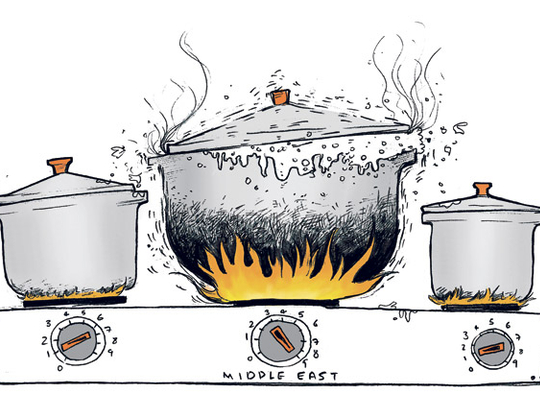
I opined in this column on the fifth of July, the Middle East is at the crossroads of prosperity and instability. That grim diagnosis was due to a host of challenges, lack of balance of power, competition, US shirking its responsibilities, walking away from its commitments, allowing Israeli intransigencies and piling the pressure on Iran. The fear of a possible miscalculation by any party involved in the brinkmanship, in addition to the ongoing regional political bickering, intra-factional rivalries and jockeying for power and revenge, produce a pessimistic assessment of where the region could be heading.
A regional conflict could easily spill over to create mayhem with catastrophic regional consequences. Since then, the regional scene has not improved, but instead the drums of war are beating even louder and more alarmingly, with chilling and conflicting assessments, sabre-rattling from all sides and studies churned out by think-tanks making us in the region grow even more edgy and nervous.
The comparison by Time magazine recently of the remarks made by US Secretary of Defence Robert Gates in 2008 and in 2010 regarding Iran's nuclear programme was chilling.
Military option against Iran
In late 2006, George W. Bush met with the Joint Chiefs of Staff at the Pentagon and asked if military action against Iran's nuclear programme was feasible. The unanimous answer was no. Air strikes could take out some of Iran's nuclear facilities, but there was no way to eliminate all of them. Some of the nuclear labs were located in heavily populated areas; others were deep underground. And Iran's ability to strike back using unconventional means, especially through its Hezbollah network, was formidable. The military option was never officially taken off the table.
"Another war in the Middle East is the last thing we need," Secretary of Defence Robert Gates wrote in 2008. It would be ‘disastrous on a number of levels.' But Gates is sounding more belligerent these days. "I don't think we're prepared to even talk about containing a nuclear Iran," he told Fox News on June 20. "We do not accept the idea of Iran having nuclear weapons." On the other hand CIA director Leon Panetta told ABC News on June 27 in answering a question "Will [sanctions] deter those [Iranians] from their ambitions with regards to nuclear capability? "Probably not." So is the military option back on the table?
To add more fuel to the fire, a recent study by the Oxford Research Group in London entitled "Military Action Against Iran: Impact and Effects" argues the potential of an Israeli military strike would have devastating consequences and would lead to a long war and argues that Israel is now fully capable of attacking Iran as it has deployed many new systems including US-built long-range strike aircraft and armed drones.
Today marks the 20th anniversary of the Iraqi invasion and occupation of Kuwait which has sunk the region into its state of instability, changed the influence of regional players and ushered in a new matrix of a fragile balance of power paradigm with protector and protectorate entities. The Iraqi invasion of Kuwait shattered the Arab counterweight power and degraded its deterrence mechanism, thus enticing regional powerhouses like Iran, Turkey, and Israel to step in to fill the vacuum and carve out their interests at the expense of Arab interests, all in our front yard. The Obama administration fully understands the centrality and the connection between finding a lasting solution to the two challenges in the region: reaching a comprehensive and lasting peace in the Middle East and dealing comprehensively with the pressing Iranian nuclear programme. Nevertheless, the US fails to make any breakthroughs in these two pressing challenges which in many ways are pushing the region into the abyss. All of that is dealing a major blow to the Obama Middle East strategy.
The mounting regional crises, if juxtaposed against the host of lingering unsolved flashpoints from the war in Afghanistan with its chilling consequences, a nuclear Pakistan, the showdown with Iran over the suffocating sanctions, and the drama associated with the "double agent" Sharham Amiri spy saga, make the picture even murkier.
The lingering political wheeling and dealing and posturing over the last five months since the parliamentary elections has paralysed Iraq and thrown it into freefall in search of a government, identity and future. Add to that the US withdrawal by the end of August of its combat troops, which could put Iran on top, and the whole region is crying for normalcy.
We also cannot miss the ever-louder drums of war between Israel and Hezbollah on the fourth anniversary of the Israeli attack on Lebanon, which took place in the summer of 2006. Hezbollah's secretary-general sounded alarm bells and raised the pitch against Israel if it dares to attack. He also warned the UN Tribunal if it indicted "rogue elements of Hezbollah" in the assassination of former Lebanese prime minister Rafik Hariri. These tensions can sink not only Lebanon, but the whole region into war.
Any of these scenarios is a plausible potential conflict in a region which has had more than its fair share of strife and wars. Avoiding war in our region through preventive diplomacy should be the top priority of all concerned. Every effort should be made to rein in those who want to ignite conflict.
Dr Abdullah Alshayji is Chairman of Political Science Department, Kuwait University.












